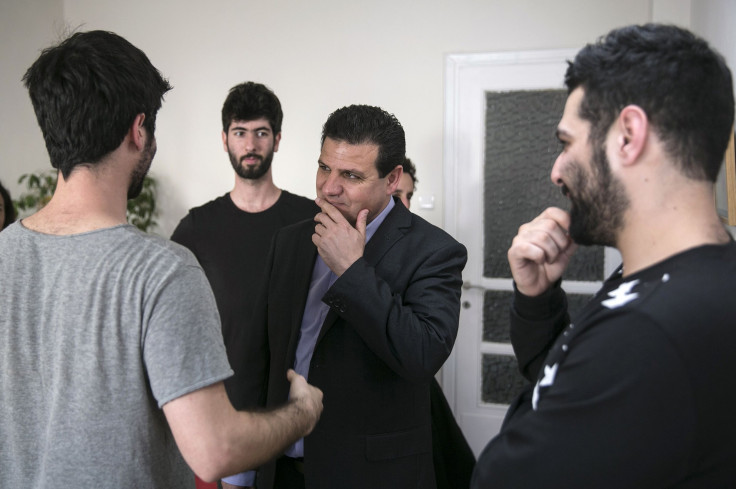Israel Elections: Arab Voters Face Defining Moment With Joint List Party Poised For Unprecedented Knesset Showing

The coming Israeli election is seen as a defining moment for Israel’s Arab minority, which, for the first time ever, is fielding a joint ticket of parties that some expect to become the third-largest faction in the parliament. The prospect of the Joint Arab List winning an unprecedented number of Knesset seat could be the first step toward greater political mobilization for Israel's Arab community as it seeks to address what many say is widespread discrimination against them in Israeli society, experts say.
Israeli Arab politicians are hoping to move their community from the sidelines of the political arena after years of declining voter turnout by Arab citizens, who constitute 20 percent of the 8 million population. “The Arab population does not want to turn inward and be isolated,” said Ayman Odeh, the leader of the joint Arab ticket, in an interview with Newsweek. “All we have to do is become determined to get involved in the political game, and the right wing will be in big trouble.”
Polls show Odeh’s Joint List political faction, which represents the first-ever alliance of Israel’s four Arab parties, winning 13 seats or more in the 120-seat Knesset, putting the group in third place behind the center-left Zionist Union and the right-wing Likud party of Prime Minister Benjamin Netanyahu, Reuters reported. Typically Arab parties win around 11 seats combined in the parliamentary body and have never been included in any Israeli government coalition.
A third-place finish for the Joint List in next week’s election would be “unprecedented” as well as a signal to the Arab minority that participating in the Israeli political arena could be advantageous, according to Brent E. Sasley, an associate professor of political science at the University of Texas at Arlington. “What's different about this election is that it's seen as the point at which things could begin to change,” he said, noting the Joint List’s potential to “act as a cohesive political force to bring about change” for the Israeli Arab community.
The Netanyahu government’s passage of a series of laws seen as detrimental to the Arab minority alongside a widening socioeconomic gap between Israeli Arabs and Jews has contributed to the sense of political alienation among Arabs in Israel. Ninety-two percent of Israeli Arabs say that welfare, discrimination and rising crime are their primary concerns, according to a survey cited by the Economist, which noted that unemployment among Arabs is twice as high as among Jews. In addition, 66 percent of Arab children were considered to be poor, in comparison to 24 percent of Jewish children.
The sense that Israel’s Arabs are regarded as second-class citizens has been solidified by rhetoric from right-wing politicians, including Foreign Minister Avigdor Lieberman, who advocated against what he saw as disloyal Arabs during his most recent inflammatory remarks against the community. “Those who are with us deserve everything, but those who are against us deserve to have their heads chopped off with an axe,” Lieberman said during a campaign event on Sunday, Israeli news site Arutz Sheva reported.
While Lieberman’s comments are no surprise given the tone of his past rhetoric, they nonetheless “reinforce the sense among much of the Arab minority that the Jewish majority doesn't want them there,” said Sasley.
Ironically, it was Lieberman who acted as a catalyst for the coalition of Arab parties, which had previously been too ideologically divided to unite. The right-wing politician’s spearheading of a “governability” law, which set a minimum 3.25 percent vote threshold for parties to enter the Knesset, was seen as an attempt to disenfranchise Arab parties. The move was one of the primary factors behind their decision to run a joint ticket.
While the historic step of Arab parties banding together to run on a joint list may have been a response to their increasing sense of marginalization in Israeli politics, it’s unclear if the unified front will be successful in addressing the community's concerns, such as discrimination. “The bigger question is what Arab politicians decide to do,” said Sasley. “The benefits that are accrued to becoming such a large party could be mitigated if they maintain confrontational rhetoric.”
Firebrand Arab Knesset member Haneen Zoabi is a notable example of the type of politician who has fought discriminatory legislation -- including laws that limit Arab access to government benefits and freedom of speech -- but whose rhetoric repels many Jews. “We don’t think a Jewish state can be democratic," Zoabi said at a recent debate, the Jerusalem Post reported. “We will fight your racist policies and we will put the fascist, chauvinist mentality under siege.”
Many of the policy goals of Arab political leaders in Israel, including greater distribution of economic benefits and equality, are not in themselves alienating to the Israeli public at large. The clout Arab parties stand to gain in the election could help them work toward those ends.
But when these policies are couched in confrontational language -- including references to Israeli Jews as colonizers and Palestinians as the indigenous inhabitants of the land -- they become unlikely to gain the kind of support needed to enact them into policy, Sasley said. “Being such a large party is great; there are benefits, it’s good for prestige. But unless that translates into policy outcomes, it's not clear that benefits will be clear to the Arab public,” he said. “And the only way to achieve policy outcomes is to work with Jewish parties.”
© Copyright IBTimes 2025. All rights reserved.






















